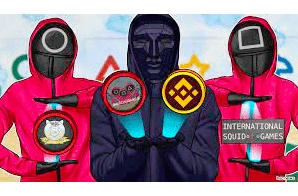An interesting piece published on Coin Desk.
They write
The most popular show in Netflix history, “Squid Game,” earned an estimated $900 million for the streaming company. And the producers are not stopping there. They are gearing up for even more revenue as they look towards season two and have secured more than two dozen trademarks for the property as they tee up a range of merchandising and licensing deals.
Sam Ewen is the head of CoinDesk Studios.
What the company did not approve of in their effort to grow their bags were the non-fungible token (NFT) collections for The Squid NFT, Squid Game Card. The two derivative franchises – one a play-to-earn contest, the other a “Squid Game Metaverse” – have brought in a combined 245 ETH ($776,685 at current pricing) in secondary sales on OpenSea. Neither has ties to Netflix or the show’s creator Hwang Dong-hyuk. Neither did the Squid Game token that ended up in a rug pull back in November that left many investors wishing they had chosen not to play.
In fact, none of the 682,569 items listed when searching Squid Game on OpenSea have any relationship with the intellectual property (IP) holder as it has not licensed anyone to use the trademark for a digital blockchain asset. Yet, all of these derivatives and, frankly, some direct stolen imagery are available for purchase or trade on the world’s largest NFT platform.
Memes and derivatives are at the heart of internet and NFT culture. Constantly evolving remixed combinations of image, audio, text, collage, video clips and more speak for us as much as they speak to us (the idea that people use memes to both represent their feelings and see their own perspectives reflected back to them in the feeds of those they follow or friend). But once you add in a creator-first economic marketplace and the value that some NFT collections have attained, trademark owners are starting to wonder why others are profiting off of their intellectual property.
NFTs themselves are not the issue, it is what the seller does with it. “NFTs themselves don’t really implicate copyright at all, because they typically just consist of a URL pointing to an image,” Brian Frye, a professor at the U.K. Rosenberg College of Law told me. “But putting the image at the URL does implicate copyright and is typically infringing if the person putting it at the URL doesn’t own the copyright or have permission to use the image in that way.”
Read more
https://www.coindesk.com/layer2/2022/01/19/the-balance-between-art-and-ip-theft-in-nft-culture/




